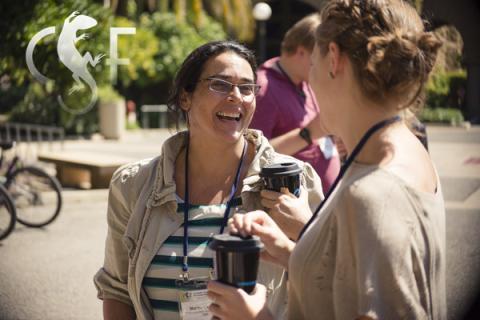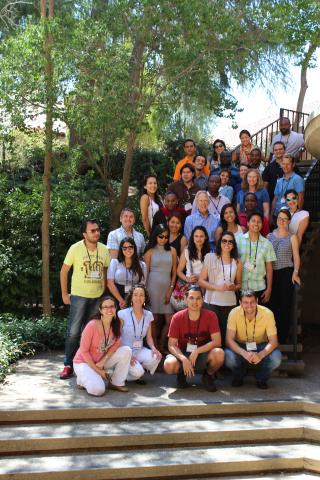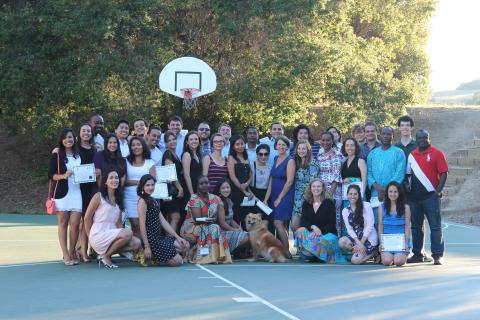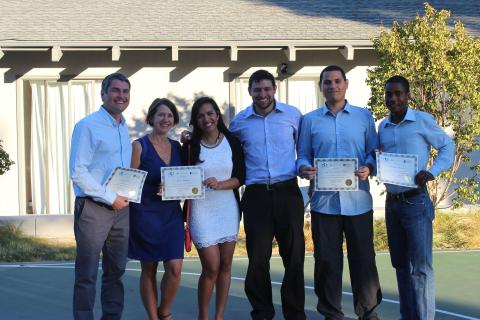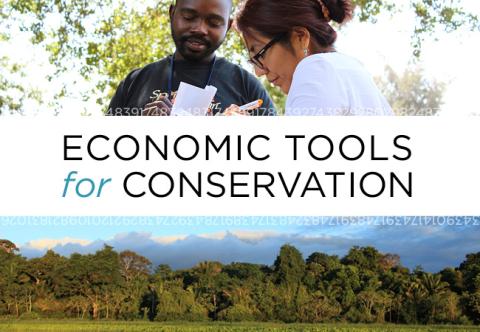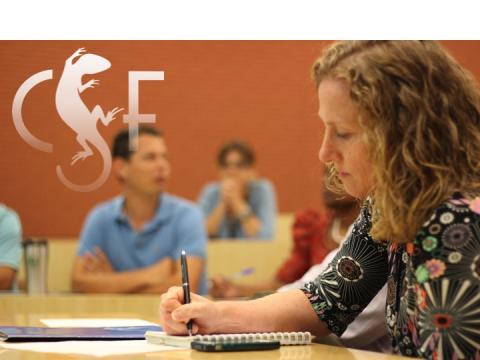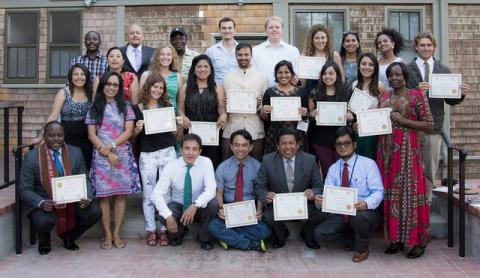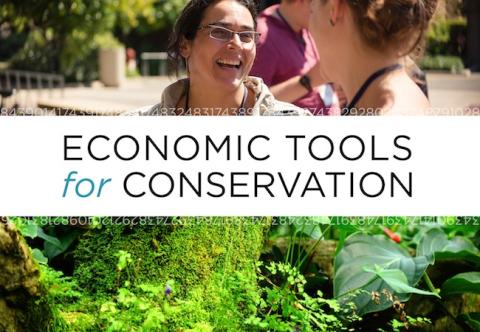
USA
"I not only learned about economic concepts that will help me in my career, facing environmental issues, but also this course gave me the opportunity to meet wonderful people from around the world. These people have inspired me to believe and to have hope for the challenges we are facing. I feel very happy and lucky to have been a part of the course and part of this wonderful group." – Isabel Felandro Llanos, Ministry of the Environment, Peru
In August 2015, CSF welcomed 25 conservation professionals from from 18 countries and 25 different organizations to the Stanford campus for our 17th annual Economic Tools for Conservation course. Instructors from the University of Wisconsin-Madison, the University of Hawai’i-Manoa, the University of Brasília, and CSF’s staff led lectures, exercises, and games in our core curriculm: Microeconomics, Natural Resource Economics, Environmental Policy and Valuation, and Cost-Benefit Analysis.
"This training is one of the greatest ideas in community-based conservation. It has empowered me as a key decision maker in a conservation organization to have not just a voice but a voice of reason. This is exactly what I needed, and now I have it, thanks to CSF." –Titus Muia, Masia Wilderness Conservation Trust, Kenya
ORIGINAL COURSE ANNOUNCEMENT
Conservation Strategy Fund is offering its 17th annual international training course, Economic Tools for Conservation, August 10-21, 2015 located at Stanford University. This course is being offered in partnership with the Stanford Woods Institute for the Environment and the Stanford Center for Conservation Biology.
Over the last decade, this course has become recognized as the premier applied economics training event for conservation professionals from around the world.
During the comprehensive two-week session, participants will learn to use economics to be more strategic and successful in their conservation work, and experience a transformational shift in how they view environmental issues. The course covers economic fundamentals, natural resource and environmental economics, communication and negotiation techniques, and hands-on experience with cost-benefit analysis. These skills are crucial at a time when global-scale environmental changes are being driven by a diversity of economic factors, and when conservation leaders are striving to harness opportunities to reward the preservation of ecosystem services.
"If you seriously want to know how economics is a powerful tool for conservation, then this is the right course for you. The course is well structured and it gives you the opportunity to meet some of the most renowned economics professors with vast knowledge to share." –Beatrice Kessey, Tanzania
The application period is now closed.
BENEFITS
Participants gain:
• An essential foundation in basic economic concepts and language.
• Insight into the drivers of environmental problems.
• The ability to formulate more effective solutions and policies for conservation.
• Skills to evaluate the costs and benefits of natural resource management and development decisions, and the ability to identify the best opportunities to apply economics to conservation.
• Invaluable practice using communication and negotiation techniques to articulate environmental values in a language that communities, businesses, and governments can understand.
• A close network with fellow conservation professionals through the unique CSF Residence Program on the Stanford campus.
COST
The total cost for the two-week course is $5000 per participant. This fee covers the following:
• Instruction by economic experts
• CSF course facilitators and residential staff
• All course materials and supplies
• Exclusive access to CSF online workspace with course reading and materials
• 13 nights lodging in CSF Course House on Stanford University campus
• All meals and coffee breaks during course, with the exception of lunch on day off
• Access to Stanford’s athletic facilities
• Laundry facilities
• Staff-led tours of Stanford campus, including campus highlights and nature walks
• Field trip to Stanford's Jasper Ridge Biological Preserve
• Assistance planning day-off activities in San Francisco and surrounding area
• Travel health insurance, if not provided by employer
• Lifetime membership in CSF’s global Alumni Network
Accepted applicants are responsible for seeking their own funding from employers, government, sponsors or other funding sources to cover their course fees and travel expenses.
PARTICIPANTS
This course is for people at the forefront of conservation challenges, including managers of conservation programs and protected areas, directors of non-governmental organizations, and representatives of government agencies. Applicants from a variety of disciplines such as biology, forestry, law, anthropology, or economics are encouraged to apply. Previous training in economics is beneficial, but not essential. Applicants must be proficient in spoken and written English.
Information for 2015 Participants
COURSE IMPACT
Year after year, participants give CSF’s Economic Tools for Conservation course highest marks in terms of content, instructors, staff and the overall course experience. Our courses also create significant and lasting impacts. Alumni report that
• The course influenced how I approach my conservation work – 95%
• The training was one of the most useful short courses I have attended – 92%
• I continue to benefit from my CSF training – 90%
"The CSF course far exceeded my expectations. The depth of the material and quality of instruction, combined with the breadth of knowledge and experience brought to the table by the rest of the participants made for a really effective, inspiring, practical learning experience. The cross-cultural and interdisciplinary exposure made every topic so interesting. I wish everyone in the conservation space had the chance to take this course." –Joyce Wang, USA
POISED FOR SUCCESS
The majority of our graduates report that their CSF training has helped them achieve a specific conservation or sustainable development success. Here is what some of our alumni say about how how CSF's training has transformed their work and led to real conservation impact:
"As a project manager/practitioner and scholar of conservation issues in the Amazon, the course was extremely useful to disentangle and advance my knowledge on the economic aspects of policies and projects promoted in the region. Understanding the language and the logic of the design of these projects and policies is becoming a key skill to be able to participate in the discussion about the future Amazonian landscape. This course has allowed me to update and improve my knowledge in the economics of natural resource management, ecosystem services, and conservation/development schemes to a grand new level." –Percy Summers, Peru
"I'm planning to apply it through the development of a basic economic course for environmental analysts in the Brazilian Ministry of Environment, in order to spread the knowledge I have been getting in the last two weeks. I am also planning to apply what I learned in the implementation of the project for which I'm currently responsible in Brazil, the TEEB Regional and Local project.” –Luana Duarte, Brazil
PROGRAM
Microeconomics
• Market theory: Supply, demand, market equilibrium, and competition.
• Externalities, market failures and public goods: Why markets are inefficient when it comes to environmental protection.
Natural Resource Economics
• Capital theory: The time value of money, interest rates and how they influence the use of natural resources.
• Renewable resource extraction: Forestry and fishery economics, optimal harvesting and policy options.
• Exercises and instruction focused on game theory and forest policy negotiation skills.
Environmental Policy
• An overview of various environmental policies to correct the problems of externalities, public goods and market failures, and the role of property rights.
• An overview of the role of environmental policies such as command and control legislation versus economic instruments for conservation such as taxes, subsidies, and tradable permit systems.
Environmental Valuation and Ecosystem Services
• Environmental values, the methods used to calculate them, and how these methods are best used in various countries.
• Exercises to identify relevant ecosystem services and appropriate valuation methods.
Cost-Benefit Analysis
• Case studies evaluating the economic feasibility of small-scale and large-scale projects, including incorporation of externalities and sensitivity analysis.
Communication
• Effective strategies for presenting economic analysis results.
INSTRUCTORS
Economic Tools for Conservation is taught by experts in environmental economics who also have extensive field experience and understand real-world conservation challenges. They are drawn from CSF staff as well as several leading academic and international institutions such as Stanford University, Harvard University, University of São Paulo, the World Bank, and Duke University. Links to individual instructor profiles are provided at the bottom of this page.
LOCATION
The course is held on the Stanford University campus in Stanford, California. Situated in the heart of Silicon Valley, Stanford is 25 miles from San Francisco and close to downtown Palo Alto. The beautiful 8,000-acre campus is surrounded by rolling oak woodlands and provides numerous opportunities for outdoor recreation.
Participants enjoy a unique residential experience in the CSF House on the Stanford campus. During the two-week course, the House transforms into a collaborative conservation community with participants connecting, sharing ideas, and creating networks that will last a lifetime. The House provides shared occupancy rooms, single-sex bathrooms on each floor, and our own kitchen and common spaces. CSF staff will facilitate evening programs to work on course exercises and case studies, lead walks and campus art tours, and help participants give presentations about their work and home countries. The CSF House is walking distance to classes and campus attractions such as the Stanford Bookstore, Coffee House, athletic facilities, museums and sculpture gardens.
During the course, participants will have the opportunity to visit Stanford’s Jasper Ridge Biological Preserve, located near Stanford University's campus in the eastern foothills of the Santa Cruz Mountains. The Preserve, which is not open to the public, encompasses remarkable geologic, topographic, and biological diversity within its almost 500 hectares, and provides a natural laboratory for researchers from all over the world, educational experiences to students and docent-led visitors, and refuge to native plants and animals. The Preserve's 9,800 square foot Sun Field station is a research and education facility that houses a research laboratory, two classrooms, a reference library, a herbarium, and staff offices, and has received awards for sustainable and energy efficient design.
ADDITIONAL INFORMATION
Click HERE for more Information for Participants
Participants should also budget for the following expenses:
• International and regional travel to and from Stanford University.
• U.S. visa fees - usually around $140. Please apply for a B1 business visa, as our short training course is considered as a professional conference or workshop.
• Airport transportation to and from Stanford - about $35 each way from either the San Francisco or San Jose airport.
• Accommodation prior to Sunday, August 9th or after Friday, August 21st. We can provide suggestions for any early arrivals or late stays outside of these dates.
• Transportation and lunch during day off - approximately $50.
• Other incidentals - $100.
"Participation in CSF’s Economic Tools for Conservation has been an extraordinary experience. The course brings together participants from all over the world, with varying backgrounds and experiences. Group discussions are therefore very interesting as we often realize that many conservation issues we are faced with are the same. Secondly, the team that CSF brings together to do the training is amazing. The content of the course will allow you to look at your work in a whole new way." -Sean Mendonca, Guyana
Apply today!

